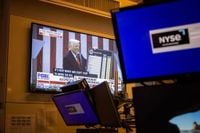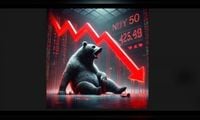U.S. stock futures plunged on April 2, 2025, following President Donald Trump's announcement of sweeping tariffs that many analysts fear could ignite a trade war. The shockwaves were felt across global markets, with the S&P 500 index losing $2 trillion in market capitalization within minutes of the announcement.
In a televised address from the White House, Trump revealed a baseline tariff of 10% on nearly all imports, alongside a staggering 25% tariff on foreign-made automobiles. This move, effective at midnight on April 2, has raised concerns about its potential impact on the already fragile U.S. economy.
Contracts on the S&P 500 fell 3.3% to 5,522, while Nasdaq 100 futures tumbled 4.2%. The Dow Jones Industrial Average futures lost 1,069 points, or 2.5%, as investors reacted to the potential for a full-blown trade war. Russell 2000 futures saw a nearly 5% drop, reflecting the widespread panic among traders.
Art Hogan, chief market strategist at B. Riley Wealth Management, characterized the announcement as "haphazard," noting that the level of complication surrounding the new tariffs was worse than anticipated. "What was delivered was as haphazard as anything this administration has done to date, and the level of complication on top of the ultimate level of new tariffs is worse than had been feared and not yet priced into the market," he told CNBC.
The tariffs are set against the backdrop of a market that had recently shown signs of resilience, with the S&P 500 rising for three consecutive days prior to the announcement. Many traders had hoped for a lighter touch from the administration, which was not delivered. Larry Tentarelli, chief technical strategist at the Blue Chip Trend Report, remarked, "If he would have come in with just the 10%, I think the markets would probably be up quite a bit right now. But because the tariffs came in bigger than many expected, I think what that does is it creates more downside volatility right now."
Shares of major multinational companies were among the hardest hit. Nike and Apple each saw drops of approximately 7%, while Five Below plummeted 14%, Dollar Tree fell 11%, and Gap dropped 8.5%. Tech stocks were not spared either, with Nvidia down 5% and Tesla losing 7% in after-hours trading.
Trump's announcement also included reciprocal tariffs that could see rates as high as 54% for China, depending on the specific duties already in place. As Trump stated during his press conference, "We will charge them approximately half of what they are and have been charging us. So, the tariffs will be not a full reciprocal." This statement has left many investors uneasy, as they now face the prospect of tariffs that could be significantly higher than originally expected.
The White House clarified that the effective tariff rate for China will be 54% when accounting for both the new reciprocal rate and existing duties. This has alarmed many in the financial sector, as the implications of such tariffs could reverberate through the global economy.
In reaction to the tariffs, global markets saw a significant selloff. The Bloomberg Dollar Spot Index fell 0.7%, while the U.S. dollar weakened against the euro and the pound. Stocks in Asia also tumbled, with Japan's Topix dropping 3.5% and Australia's S&P/ASX 200 falling 1.4%.
As the markets reeled from the news, investors began to look for safe havens. U.S. Treasury yields fell to their lowest levels in over five months, with the yield on 10-year Treasuries declining six basis points to 4.07%. The Japanese yen strengthened as traders sought refuge from the volatility.
Despite the grim outlook, some analysts believe that this could be a buying opportunity. Steve Chiavarone at Federated Hermes suggested that the announcement might mark the highest levels of tariffs, implying that future negotiations could lead to lower rates. "This may create enough of a selloff over the next day or so that it creates a buying opportunity," he said.
As the dust settles from Trump's announcement, the focus now shifts to how trading partners will respond. Treasury Secretary Scott Bessent urged caution against retaliatory measures, emphasizing, "As long as you don’t retaliate this is the high end of the number." However, the uncertainty surrounding the tariffs has already begun to affect market sentiment, with analysts trimming forecasts for U.S. stocks.
In summary, the announcement of new tariffs has shaken the foundations of global financial markets, leading to significant losses across major indices and raising fears of an impending trade war. Investors are left grappling with the implications of these tariffs and how they will affect the economy in the months to come.







